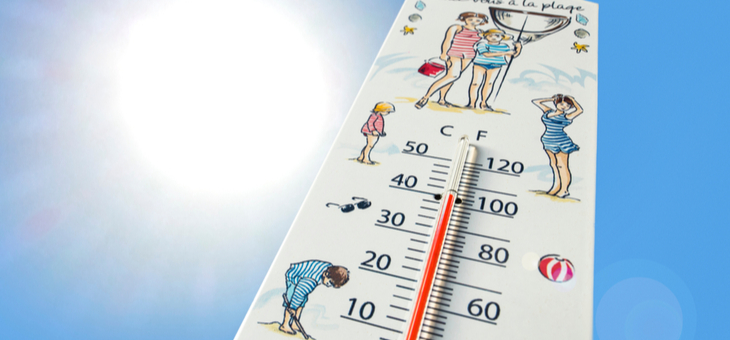Experts are warning that heatwaves present a greater risk to public health than bushfires.
Heat-related illness is our “silent killer”, says Dr Lai Heng Foong, chair of the Australasian College for Emergency Medicine’s Public Health and Disaster Committee.
She told RN breakfast that climate change was bringing more extreme weather events and heatwaves would be more severe and more frequent.
“More people have died from heat-related illness in the past 100 years that any natural hazard, including bushfires,” she said. “Because it’s not as dramatic as a bushfire, people are just staying at home doing their normal things but suffering because of the heat.”
She said last weekend’s record temperatures on the eastern seaboard saw hospital admissions for dehydration, collapse and heat stroke.
Ambulance NSW recorded its third busiest day on record on Saturday, as temperatures soared above 40 degrees in Sydney.
During the 2019-20 summer heatwave, Guardian Australia reported that extreme heat had killed more people in the period 1900 to 2011 than all other natural disasters put together, with 4555 deaths attributable to heat-related illness. The next closest tally was deaths caused by tropical cyclones, at just 1285.
It said Australia was heating “faster than the global average”, but as temperatures increased due to escalating greenhouse gases in the atmosphere, maximum temperatures were rising even more sharply, and the greatest threat was an “escalation in heatwaves”.
Actual heatwave death rates are worse than reported, says Dr Simon Quilty, a Northern Territory clinician and ANU lecturer.
“All Territorians know that if you go for a very long walk on a very hot day, you might not come back, because we feel how heat affects the body in all sorts of ways,” he said.
“But if you die of a heart attack on a very hot day, your death certificate will say that you died of a heart attack – it won’t reflect the ways in which heat contributed to your condition.”
Dr Quilty told ABC news that deaths caused by high temperatures were often not recorded as heat stroke.
“With every degree that it gets hotter, we know that more people will die,” he said.
“For instance, you are much more likely to have a heart attack when the weather is really hot, and that’s complex but it’s because your body is working harder to stay cool. Your heart may need to pump harder to help your body cool itself. If you become dehydrated, your blood becomes slightly thicker.
“So, all these things together may contribute to you having a slightly increased risk of having a heart attack.”
He said patients with infections, heart disease, kidney disease and pneumonia were “pushed over the edge,” by heatwaves.
“For instance, maybe they had an epileptic seizure and that person falls on the ground and burns themselves on bitumen that is 70’C, or perhaps someone has run out of electricity at their house, so they try to get to the shopping centre for relief but they don’t quite make it and they collapse on the way.”
Dr Quilty is campaigning for death certificates to include the weather on the day the patient died.
There were 1,717,224 deaths in Australia between 2006 and 2017. Heat was listed as a cause of death on fewer than 1000 of them. But Dr Quilty’s research team concluded that heat was likely to have contributed to at least 37,000 of the deaths.
Dr Lai Heng Foong says part of the problem for average Australians is that we’re accustomed to hot temperatures and fail to register the difference between 35 degrees and 42 degrees.
She says there need to be more warnings about the dangers of going out during the day when a heatwave is impending.
And she says we must check on elderly family members living alone.
“You should check on them on a daily basis and make sure the fridge is working, that they have food and water. Because what can happen with the elderly and disabled people is that they might feel thirsty, but they can’t get to the fridge. You need to have a bottle of water next to them; they need to be checked upon to make sure they’re keeping cool and have fans that are working.”
A report released this week, written by Victoria’s chief health officer Professor Brett Sutton, has linked levels of infectious disease to climate change.
“Increased temperatures and risk of bushfires would impact poorly on air quality, while more frequent downpours and flooding would cause waterborne and vector-borne diseases to increase,” news.com.au reports.
In the report Prof. Sutton said severe weather would only continue to impact the spread of infectious diseases.
It cited a United Kingdom review which predicted that by 2050 there would be more than 10 million deaths every year around the world due to untreatable infections.
“Immunisation, food safety measures and keeping our drinking water safe are key public health activities that we can sometimes take for granted,” he wrote.
Are you aware of how heat can affect your body? Have you cared for an elderly family member during a heatwave?
If you enjoy our content, don’t keep it to yourself. Share our free eNews with your friends and encourage them to sign up.
Related articles:
https://www.yourlifechoices.com.au/fun/entertainment/things-youll-know-if-you-hate-summer
https://www.yourlifechoices.com.au/health/news/eat-or-heats-tragic-consequences
https://www.yourlifechoices.com.au/health/news/the-areas-where-heart-disease-is-rife

